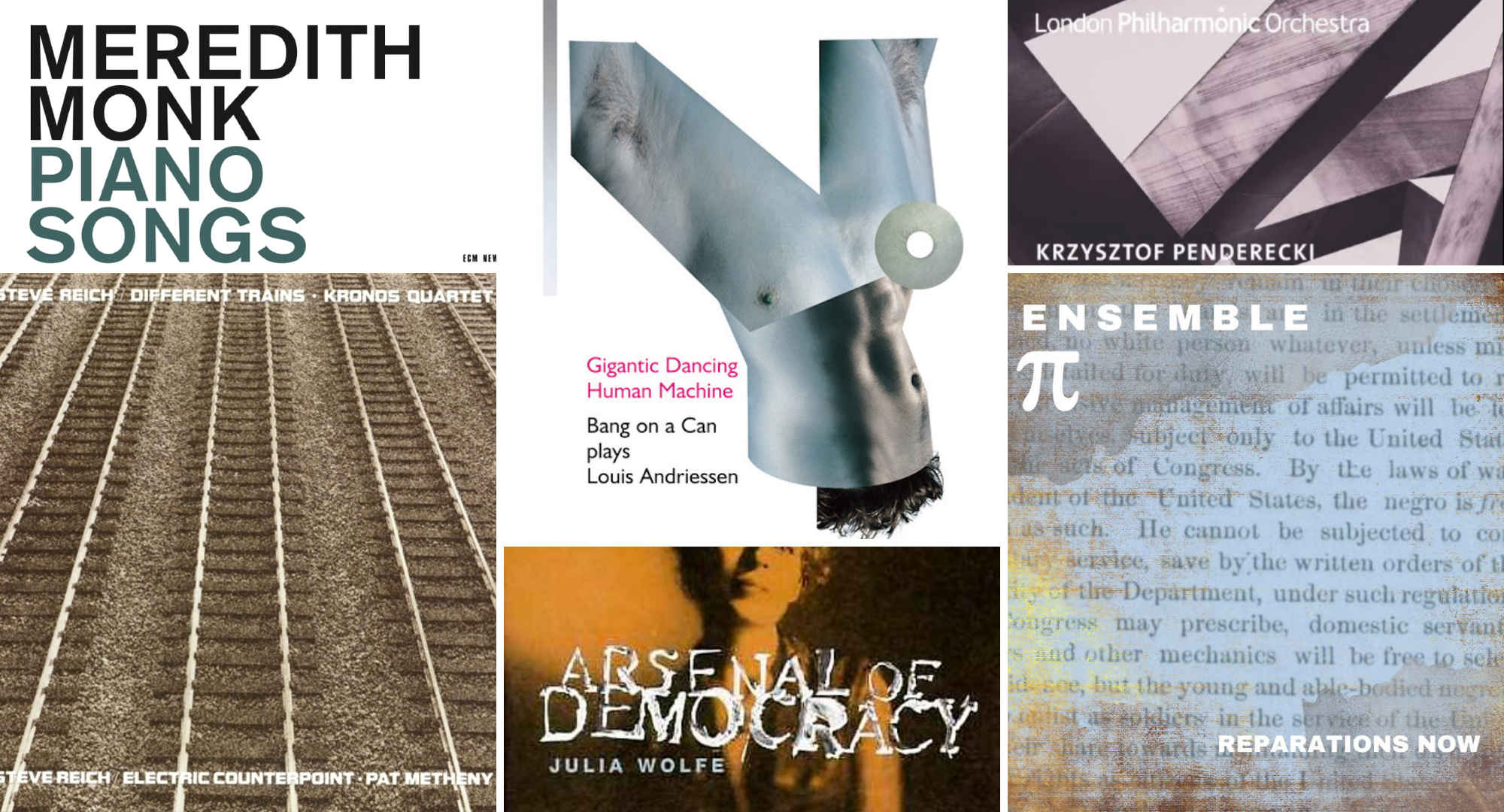I’ve enjoyed a trend on Instagram reels recently which is to bring up a list of explicitly political books and then describe their stories as a-political romps. EX: Parable of the Sower is about a girl who really wants to start a community garden. So in thinking about works that could fit that trend, this playlist came to fruition. I won’t give them the same treatment since I don’t think it will work in just a blog format. Regardless, this is the backstory here. I actually didn’t know the story behind some of these works. I didn’t know about Different Trains or was even 100% sure about Workers Union (was it just me assuming it was about… ya know… actual workers unions?). Enjoy these heavy hitters and the heavier reasons they were written.
I give this playlist a Difficult Listening Hour rating of 7/10.
To have these playlists delivered to your inbox every week, sign up for my newsletter.
- Different Trains, America, Before the War by Steve Reich performed by Kronos Quartet. Album: Different Trains/Electric Counterpoint. From the composer, “Different Trains, for String Quartet and pre-recorded performance tape, begins a new way of composing that has its roots in my early tape pieces It’s Gonna Rain (1965) and Come Out (1966). The basic idea is that carefully chosen speech recordings generate the musical materials for musical instruments. The idea for the piece came from my childhood. When I was one year old my parents separated. My singer, song writer mother moved to Los Angeles and my attorney father stayed in New York. Since they arranged divided custody, I travelled back and forth by train frequently between New York and Los Angeles from 1939 to 1942 accompanied by my governess. While the trips were exciting and romantic at the time I now look back and think that, if I had been in Europe during this period, as a Jew I would have had to ride very different trains. With this in mind I wanted to make a piece that would accurately reflect the whole situation.”
2.The Pattern by Allison Loggins-Hull performed by Ensemble Pi. Album: Reparations NOW. Composer’s notes, “The Pattern serves as a case for reparations for the African American community and embodies the tumultuous relationship between white Americans and black Americans—from the beginning of slavery, to today. Moments throughout American history demonstrate the many ways in which white supremacy has, very intentionally, created roadblocks against progress for African Americans. For example, after the Civil War and during Reconstruction, black Americans began to participate in government and build their own communities. This was met by riots throughout the South, led by white mobs, and policy was enacted to overthrow the participation of blacks in politics. During Jim Crow, blacks were not only segregated from whites and received less resources, but they were also disenfranchised as voting citizens. Among many oppressive acts leading up to the Civil Rights Movement, black Americans experienced redlining, making it next to impossible to legitimately purchase a home and build wealth.”
3. Ellis Island by Meredith Monk performed by Bruce Brubaker and Ursula Oppens. Album: Meredith Monk: Piano Songs. This work was composed for a film of the same name, which has been described as, “An intensely memorable film evocation of America’s immigrants; set in the crumbling halls of contemporary Ellis Island…spare, sober, and exquisite, it recalls the formality and beauty of vintage photos.” While the music in the trailer is not the music selected for this playlist, you can watch it below.
4. Threnody for the Victims of Hiroshima by Krzysztof Penderecki performed by London Philharmonic Orchestra. Album: Penderecki: Horn and Violin Concertos. Watch the animated version of the score below and really listen. Now imagine hearing this for the first time, in 1961, ON THE RADIO. Its premiere was for a radio audience. The backstory for this piece is best summed up by the San Francisco Symphony, “The 1950s witnessed an extraordinary revitalization of Polish music. As the Soviet Union gradually softened its grip on cultural activities in that nation, twentieth-century classics by Stravinsky, Schoenberg, and Webern received their belated first hearings there, and several luminaries of the new music scene, such as Pierre Boulez, Luigi Nono, John Cage, and Karlheinz Stockhausen, found avid listeners among Polish audiences. The watershed moment came in 1956, when the inaugural Warsaw Autumn Festival of contemporary music publicly aired truly avant-garde works in Poland for the first time in decades.”
5. Worker’s Union by Louis Andriessen performed by Bang on a Can All Stars. Album: Gigantic Dancing Human Machine. The first time I heard Worker’s Union was one of my years as a (paid!) intern at the Ojai Music Festival. Members from eighth blackbird and other musical artists from the festival, including a contemporary recorder ensemble, marched through the audience to join an already robust ensemble on stage. It was a true meeting of giants and a meeting of the masses. I later performed this work twice and it is emotional it is so difficult to perform. Retaining your sense of self when working towards a larger, distant cause is emotional as much as it is physical. Andriessen states that “This piece is a combination of individual freedom and severe discipline: its rhythm is exactly fixed; the pitch, on the other hand, is indicated only approximately, on a single-lined stave. It is difficult to play in an ensemble and to remain in step, sort of like organizing and carrying on political action.”
This work is hard to understand without knowing the score. I suggest you take a look here while you list. There is a lot of music, not must “new music” that is better in person. This piece and Terry Riley’s In C are two that I truly do not think can be appropriately captured in a recording.
6. Arsenal of Democracy by Julia Wolfe performed by Orkest de Volharding. Album: Arsenal of Democracy. Note: This work is NOT on the Spotify version of the playlist. Dig Deep also by Julia Wolfe is its placeholder. It is only appropriate that this work comes on the tails of Worker’s Union. This work was commissioned by Orkest de Volharding – an ensemble founded by Louis Andriessen and named after one of his works. The ensemble started as a political street band and eventually morphed into a contemporary music ensemble and finally got a conductor almost 20 years after its inception. Julia Wolfe says this about the piece, “In 1992 I went to live in Amsterdam for a year. … Art is a crucial part of Dutch society. … I went to lots of concerts, joined the composers’ ping-pong team, and wrote Arsenal of Democracy. … The group is loud and tough and they’re organized in a socialistic framework — everyone has equal say, everyone arrives at consensus decisions. The title of my piece is taken from a phrase coined by Franklin Roosevelt referring to the United States’ role as an arsenal before fully entering into WWII. In more recent U.S. history this ”arsenal of democracy” has reached terrifying and absurd proportions. I imagined that Orkest de Volharding would be a far better arsenal, with trumpets and trombones on the front lines.” Watch the composer speak more about the work here.

